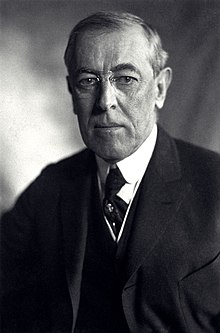Search This Blog
Sunday, April 15, 2012
Woodrow Wilson
Served as president from 1913-1921
Era: Foreign Policy, Progressive Era and WWI
American Identity and Culture
Muckrakers were journalists who informed the public of the dirty realities of party politics and the squalid conditions of factories and city slums. An example of a muckraker was photojournalist Jacob Riis who published pictures and articles of tenement life in How the Other Half Lives (1890). However, the popularity of muckraking books and magazine articles began to decline. One reason was that writers had a harder time topping the sensationalism of the last story. Another reason was that publishers were expanding and faced economic pressure from banks and advertisers to tone down their criticism on businesses. Lastly, corporations were becoming more aware of their public image.
Economic Transformations and Globalization
Wilson attacked what he called “the triple wall of privilege”: tariffs, banking, and trusts with his New Freedom program. He addressed Congress in person about the need to lower tariff rates to bring down consumer prices. The Underwood Tariff in 1913 lowered tariffs substantially and introduced a graduated income tax rate from one percent to six percent. He also proposed a national banking system with twelve district banks that would be supervised by a Federal Reserve Board. Wilson passed the Clayton Antitrust Act which strengthened the Sherman Antitrust Act for breaking up monopolies and exempted unions from being prosecuted as trusts. The Federal trade Commission emerged as an agency that investigated and prosecuted any “unfair trade practice” in industries.
Environment
Woodrow Wilson also played a role in helping the environment. In 1913, he signed the Raker Act. This gave San Francisco permission to construct a dam. In 1916, Wilson oversaw the creation of the National Park Service in 1916. He also began the Smith-Lever Act of 1914, which established extension services through the land-grant universities to spread information on agriculture and other topics. Wilson's anti-trust and labor laws also probably helped become the setting for future environmental regulations through the increase of government regulation of corporate America.
Politics and Citizenship
An issue that occurred during Wilson’s presidency was women’s suffrage. Women began taking a more militant approach to achieve their goal of gaining the vote and took to the streets with mass pickets, parades, and hunger strikes. In 1916, Alice Paul formed the National Women’s Party and focused on winning Congress’s support for an amendment to the Constitution. President Wilson finally adopted a women’s suffrage amendment which was ratified as the Nineteenth Amendment in 1920. This guaranteed women’s right to vote in all elections at the local, state, and national levels.
Slavery and its legacies in North America
Unfortunately, Wilson was a noted racist. He segregated the federal government by ordering the Washington offices to be segregated along with the Treasury and Navy. He even praised Birth of a Nation, a controversial movie that negatively depicted African Americans. During his presidency, the House passed a law making interracial marriages illegal in the District of Columbia. Wilson’s excuse for his actions was that they were meant to ease racial tensions between the two groups of people.
War and Diplomacy
During his presidency, Woodrow Wilson led the United States into World War I. Once peace negotiations came around, he proposed a detailed list of war aims known as the Fourteen Points. His principles for securing peace were: recognition of freedom of the seas, an end to the making secret treaties, reduction of national armaments, an “impartial adjustment of all colonial claims,” self-determination for various nationalities within Austria-Hungary, and the creation of an international peacekeeping organization. Although Wilson agreed to compromise on most of his Fourteen Points, he insisted on the formation of a peacekeeping organization, the League of Nations. Once peace negotiations were over, he returned to the United States to ratify the Treaty of Versailles, including the League of Nations. However, it failed to win approval and was never ratified by the United States. In turn, this weakened the League of Nations.
Subscribe to:
Post Comments (Atom)

No comments:
Post a Comment